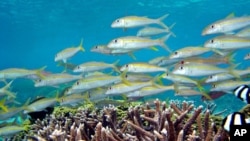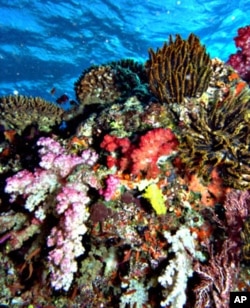A new study out this week highlights the role that coral reefs play in evolution, adding another reason to preserve these delicate, diverse, and often beautiful ecosystems.
Many of the world's coral reefs are threatened by ocean acidification and pollution, among other things.
Wolfgang Kiessling of Berlin's Natural History Museum says that concerns ecologists because of the vital role reefs play in ocean ecosystems.
"They're really important to marine ecology because they host thousands of fish, for example," he said. "This is where the young fish grow up. And they host millions of species of invertebrates, and so they are ecologically really key to tropical marine ecosystems."
The conventional view has been that reefs attract a diverse population – in part because they have lots of nooks and crannies where fish can hide from predators – but that they aren't necessarily places where new species evolve.
Kiessling began to doubt this when he looked at the evolutionary record following the mass extinction 65 million years ago that wiped out the dinosaurs. That event signaled a slowdown in the creation of new species.
"We see that evolution slowed a bit, and this was basically – that was my guess – because so many reefs were killed as well. So it took a long time for diversity to build up again in the aftermath."
Using a vast, online catalog called the Paleobiology Database, Kiessling and his colleagues analyzed the occurrence of hundreds of thousands of new species as documented by researchers around the world.
"And we found that 50 percent more than we would expect by chance did first occur in reefs," he said.
Kiessling, who is also a professor at Germany's Humboldt University, said in an interview that he was surprised to find that this idea of the reef as a cradle of evolution even applies to species not known as reef-dwellers. They may evolve in the reef environment, then migrate elsewhere.
"So species get generated, like even clams and snails, crabs, and so on, and then, when they, later in their evolutionary history, they move out of the reefs, and then they export diversity, basically, to other areas."
All of which, he says, suggests that there's more reason than ever to safeguard ocean reefs.
"The biggest outcome of our study is how really important reefs are for evolutionary processes, not just for ecology. So when we lose reefs, we lose basically the cradles of evolution in the oceans in the long run."
Wolfgang Kiessling describes his research in a paper published in the journal Science.





